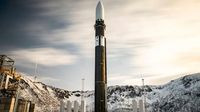The inaugural launch of the Isar Aerospace Spectrum rocket ended in failure on March 30, 2025, less than thirty seconds into its flight. Spectrum is a two-stage rocket standing approximately 28 metres tall and designed to deliver up to 1,000 kilograms to low Earth orbit. It is powered by ten Aquila engines developed in-house, with nine on the first stage and a vacuum-optimized version on the upper stage. The engines burn liquid oxygen and liquid propane.
While initial launches will take place from Andøya Spaceport in Norway, Isar Aerospace has also secured access to a new commercial launch pad at the Guiana Space Centre. The inaugural Spectrum mission, which the company called “Going Full Spectrum,” lifted off at 12:30 CET on March 30 from Isar Aerospace’s dedicated launch pad at Andøya Spaceport. Originally slated for March 24, the launch was delayed several times due to unfavorable weather.
After a successful liftoff, the rocket’s vector control system appeared to begin overcorrecting around 18 seconds into the flight. Approximately 10 seconds later, all first-stage engines shut down, and the rocket began falling. The broadcast director cut away just before an explosion was heard. While the rocket appeared to fall close to the launchpad exploding as it hit the ground, Isar Aerospace CEO Daniel Metzler has confirmed that it “didn’t blow up the pad.”
“Success to get off the pad, and lots of data already obtained,” said ESA director general Josef Aschbacher following the failure. “I am sure Isar Aerospace will learn a lot. Rocket launch is hard. Never give up, move forward with even more energy!”
Prior to the launch, Isar Aerospace CEO Daniel Metzler announced that the company was already working on its second and third Spectrum rockets, adding that it would “swiftly return to the launch pad no matter the outcome of the first flight test.” Founded in 2018, Isar Aerospace has raised over €400 million, most recently closing a €65 million Series C extension in June 2024 that included a contribution from the NATO Innovation Fund.
In May 2024, the company signed a contract with commercial real estate developer VGP Group to build its new headquarters on a 40,000-square-metre plot near Munich. According to Isar, the facility will be “the world’s most modern production facility for orbital launch vehicles.” Once completed, it will be capable of producing up to 40 Spectrum rockets per year.
The Isar Aerospace "Spectrum" rocket launched from Andøya Spaceport in Norway on March 30, 2025, but crashed after a few seconds. The launch had been repeatedly postponed earlier in the week of March 30, 2025, due to weather conditions. The rocket launch was a test to gather data and experience; the goal was not to reach Earth orbit on the first try.
The tested carrier rocket was a double premiere: the first flight for Isar Aerospace and the first launch of an orbital carrier rocket in Western Europe. Isar Aerospace has raised more than 400 million euros in capital. The tested carrier rocket can transport a payload of up to one ton. "Spectrum" is 28 meters long. The "Falcon 9" of "SpaceX" is 70 meters long and can transport up to 22.8 tons.
Isar Aerospace launched its first test rocket "Spectrum" on March 30, 2025, from Andøya Spaceport in Norway. The rocket did not reach the intended speed and crashed a few seconds after launch; sounds of an explosion were heard. Isar-Areospace-CEO Daniel Metzler said before the start that he would consider it a success if the rocket flew for about 30 seconds. On January 16, 2025, the "New Glenn" rocket from Blue Origin reached near-Earth orbit after 13 minutes.
The "Spectrum 2" rocket is already ready. In 2023, Europe invested 1.9 billion US dollars in Space-Tech-Startups, with Germany leading at 273 million US dollars. Isar Aerospace was founded in 2019 and currently employs more than 400 people. Isar Aerospace is considered the best-funded Space-Tech-Startup in Europe.
The test rocket aimed at kickstarting satellite launches from Europe fell to the ground and exploded 40 seconds after takeoff from a Norwegian space port on March 30, 2025, in what German startup Isar Aerospace had described as an initial test. The uncrewed Spectrum rocket was billed as the first attempt at an orbital flight to originate from Europe, where several nations, including Sweden and Britain, have said they want a share of a growing market for commercial space missions.
Isar Aerospace, which had warned that the initial launch could end prematurely, said the test produced extensive data that its team can learn from. Blasting off from Norway's Arctic Andøya Spaceport, the Spectrum is designed for small and medium-sized satellites weighing up to one metric tonne, although it did not carry a payload on its maiden voyage. The mission was intended to collect data on the company's in-house developed launch vehicle, in a first integrated test of all its systems, Bavarian Isar Aerospace said last week.
As Europe continues to invest heavily in space technology, Isar Aerospace's efforts signal a significant step toward establishing a competitive presence in the commercial space launch market. With ambitious plans for future launches and a commitment to learning from setbacks, the company aims to pave the way for more frequent and reliable access to space from European soil.






